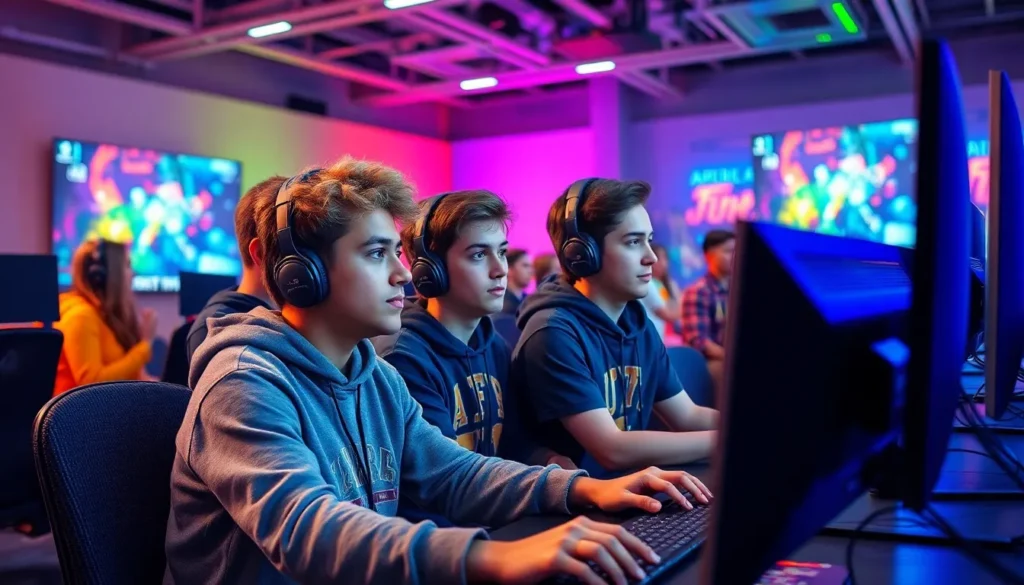Esports in education? It sounds like a plot twist from a sci-fi movie, but it’s happening right now! As schools embrace this digital revolution, students are trading textbooks for gaming headsets, and it’s not just for fun. These virtual arenas are transforming the way they learn, fostering teamwork, strategy, and critical thinking skills—all while having a blast.
Esports in Education
Esports have emerged as a dynamic component within educational environments. Schools across the globe recognize their potential to engage students in meaningful ways. This integration transforms traditional learning methodologies into interactive experiences.
Participation in esports cultivates essential skills. Students enhance teamwork capabilities, develop strategic thinking, and practice critical problem-solving. Engaging in competitive gaming enhances communication and collaboration among peers. Educators note improvement in students’ social interactions and emotional development.
Some institutions implement esports programs as part of their curricula. These programs not only entertain but also provide pathways to academic achievement. Students involved in esports often demonstrate increased motivation and commitment to their studies. Involvement in esports encourages attendance and participation rates in schools.
Research supports the educational benefits of esports. A study by the University of California highlighted improved cognitive skills and academic performance among students participating in esports activities. Another report from the National Association of Collegiate Esports indicates the rise in scholarships offered for esports athletes, enhancing opportunities for students.
Many schools also host esports tournaments, fostering a sense of community. These events promote school spirit, bringing together students, faculty, and parents. As esports continue to gain popularity, educators explore further integration strategies that support learning objectives and career readiness.
Esports represent a valuable tool for educators seeking to improve engagement. They bridge the gap between academic content and student interests, creating a deeper connection to learning.
Benefits of Esports in Educational Settings

Esports in educational settings offers numerous advantages that enhance the learning experience. These benefits range from increased student engagement to the development of essential skills.
Enhanced Engagement and Motivation
Students become more engaged through participation in esports. This gaming format captures their interest, leading to active classroom involvement. Schools that embrace esports programs often see higher attendance rates. Traditional learning methods may not inspire every student, but esports fosters a sense of belonging. Students connect with peers who share similar passions, creating a vibrant learning community. Increased motivation often translates into improved academic performance. As students become invested in their gaming activities, they display a more positive attitude toward school.
Skill Development through Competitive Play
Competitive play in esports cultivates vital skills in students. Problem-solving abilities improve as they navigate in-game challenges. Teamwork becomes essential, as players learn to collaborate effectively with their teammates. Communication skills are enhanced during high-pressure situations where clear dialogue is crucial. Strategic thinking and decision-making skills develop quickly within the fast-paced environment of gaming. Additionally, students gain resilience as they face defeats and learn to adapt for future success. Those involved in esports develop transferable skills that benefit them in both academic and professional settings.
Challenges and Considerations
Integrating esports into education presents various challenges that institutions must navigate. Addressing these challenges is essential for maximizing the potential benefits.
Addressing Stereotypes and Misconceptions
Stereotypes surrounding gaming often portray it as a waste of time. Many dismiss esports as simply entertainment, failing to recognize its educational value. Educators need to challenge these misconceptions by showcasing successful programs that highlight cognitive and social benefits. Research shows students participating in esports improve teamwork and strategic thinking skills. By promoting positive narratives around esports, schools can foster greater acceptance among parents and stakeholders. Changing perceptions can ultimately lead to expanded support for esports initiatives within educational frameworks.
Ensuring Proper Implementation in Curricula
Implementing esports requires careful planning to align with educational objectives. Schools should ensure programs focus on essential skills such as communication and critical thinking. Training educators on esports’ pedagogical benefits can enhance curriculum integration. Institutions face the challenge of balancing competitive play and academics, avoiding potential distractions. Establishing clear guidelines and objectives helps maintain focus on learning outcomes. Continuous evaluation and adaptation of esports programs are important for identifying areas of improvement and ensuring effective learning experiences.
Case Studies of Successful Esports Programs
Esports programs in education showcase impactful outcomes across various levels. Schools and universities employ these initiatives to foster engagement and skill development among students.
High School Initiatives
Several high schools have established esports teams, with notable examples including the North America Scholastic Esports Federation (NASEF). NASEF supports districts by providing resources and curriculum integration. Schools reporting participation in competitive leagues indicate improvements in teamwork and communication skills. One high school in California documented a 30% increase in student attendance since introducing their esports program. Additional data shows that students display enhanced problem-solving abilities, translating beyond the gaming environment. These initiatives motivate students to connect with peers, promote collaboration, and offer pathways to scholarships.
Collegiate Esports Leagues
Collegiate esports leagues are gaining traction, exemplified by organizations like the National Association of Collegiate Esports (NACE). Over 200 member institutions actively support competitions that enhance student engagement. NACE data reveals that participants often demonstrate academic success, with a reported average GPA of 3.0 or higher among esports athletes. Schools leverage these leagues to provide scholarships, enabling students to pursue higher education. Additionally, players develop valuable skills applicable in various career fields. These competitive environments encourage leadership development, strategic thinking, and resilience among participants, contributing to personal and professional growth.
Future of Esports in Education
Esports integration in education shows promising growth and innovation. The increasing interest among students creates an opportunity for institutions to design specialized curricula that leverage this trend. Future educational programs likely focus on blending gaming with academic subjects, enhancing both engagement and learning outcomes.
Research indicates that inclusion of esports significantly boosts student motivation. As schools develop new strategies for program implementation, educators can target specific skills like problem-solving and teamwork. Continuous development in esports curricula ensures that students gain practical skills essential for future careers.
Increasing collaboration among educational institutions, industry leaders, and esports organizations plays a crucial role. Colleges and universities can provide scholarship opportunities that attract more students to their programs. Many institutions report positive feedback, noting enhanced academic performance and participation in extracurricular activities.
Looking ahead, esports could serve as a powerful tool for educators. Student engagement often rises when immersive learning experiences are introduced, fostering a supportive learning environment. Scholars predict a rise in dedicated esports programs as more institutions recognize the successful models already in practice.
Additionally, the understanding of esports’ educational benefits is evolving. Educators have the chance to address misconceptions surrounding gaming, highlighting its cognitive advantages. Emphasizing teamwork, strategic thinking, and emotional resilience prepares students for the complexities of modern work environments.
As technology advances, future esports programs will likely incorporate more sophisticated tools and platforms. This evolution may lead to further integration of virtual reality and artificial intelligence in the curriculum. Overall, the success of esports in education hinges on thoughtful implementation and ongoing assessment of program effectiveness.
Conclusion
Esports in education is reshaping the learning landscape by fostering essential skills and enhancing student engagement. As more institutions recognize the benefits of integrating gaming into curricula, they’re not only motivating students but also preparing them for future careers. The collaborative nature of esports cultivates teamwork and communication while encouraging critical thinking and resilience.
With continued support from educators and industry leaders, esports programs can thrive and evolve. By addressing misconceptions and implementing thoughtful strategies, schools can create enriching environments that promote both academic success and personal growth. The future of esports in education looks promising, paving the way for innovative learning experiences that resonate with today’s students.

